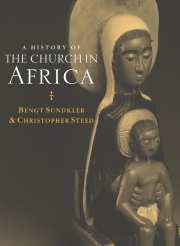Book contents
- Frontmatter
- Contents
- List of maps
- Acknowledgements
- List of abbreviations
- Introduction
- PART I THE FIRST FOURTEEN HUNDRED YEARS
- PART II THE MIDDLE AGES 1415 – 1787
- PART III THE LONG NINETEENTH CENTURY 1787 – 1919
- PART IV THE COLONIAL EXPERIENCE 1920 – 1959
- PART V INDEPENDENT AFRICA 1960 – 92
- 18 Introduction to Independent Africa
- 19 North and North-Eastern Africa
- 20 West Africa
- 21 Central Africa
- 22 Southern Africa
- 23 East Africa
- 24 Ecumenical Perspectives
- 25 Epilogue
- Notes
- Bibliography
- Name index
- Subject index
21 - Central Africa
from PART V - INDEPENDENT AFRICA 1960 – 92
Published online by Cambridge University Press: 16 September 2009
- Frontmatter
- Contents
- List of maps
- Acknowledgements
- List of abbreviations
- Introduction
- PART I THE FIRST FOURTEEN HUNDRED YEARS
- PART II THE MIDDLE AGES 1415 – 1787
- PART III THE LONG NINETEENTH CENTURY 1787 – 1919
- PART IV THE COLONIAL EXPERIENCE 1920 – 1959
- PART V INDEPENDENT AFRICA 1960 – 92
- 18 Introduction to Independent Africa
- 19 North and North-Eastern Africa
- 20 West Africa
- 21 Central Africa
- 22 Southern Africa
- 23 East Africa
- 24 Ecumenical Perspectives
- 25 Epilogue
- Notes
- Bibliography
- Name index
- Subject index
Summary
CAMEROON
The north–south syndrome was an obvious factor also in Cameroon. On the political scene the ‘UPC’, ‘Union of the Populations of Cameroon’ seemed as a matter of course a southern idea and a Protestant idea, with an intellectual background in American Presbyterian Protestantism and a tradition of American liberalism and educational ambition. In the noisy milieu of the 1950s – African nationalism, ‘pro-Independence’ connections with the United Nations (Cameroon was a trustee territory) and internationalism – it was easy to suggest that Reuben Um Nyobe, the leader of Cameroonian nationalism, was an African Communist. He was portrayed as a West-Central African version of Mao and Ho Chi Minh, a highly inflammable comparison for French imperialists at a time when the French naturally felt that one Dien Bien Fu was more than enough. Not that all Protestants were ‘UPC’ or leftists by any means.
In Douala the vigorous Presbyterian Pastor Joseph Tjega would not admit Um Nyobe to the Lord's Table. In fact, he excommunicated the man who for a decade ‘symbolized and embodied Cameroon nationalism’ for being a communist and an atheist. The Catholic Ewondo, in Yaoundé region, would not fall for such hazardous temptations. Solid and conservative they followed Dr Aujoulat's ‘Bloc democratic Camerounais’ and could be trusted to subscribe to a French federal programme. So it was also with the Fulani Muslims further north. A new party Union Camerounaise was formed by Ahmadou Ahidjo.
- Type
- Chapter
- Information
- A History of the Church in Africa , pp. 957 - 973Publisher: Cambridge University PressPrint publication year: 2000



